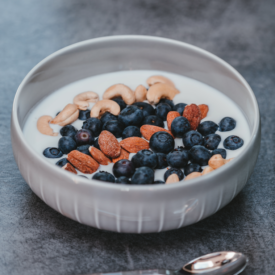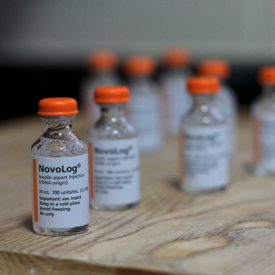Vitamin D and Mental Health
Now that autumn has arrived, the sunlight is fading, and leaves are falling. Our vitamin D levels are also at risk of falling because its synthesis in our bodies depends on exposure to the ultraviolet radiation within sunlight. What is vitamin D and why is it important?The active form of vitamin D, calcitriol, acts as a hormone. In the target cells, it binds to the vitamin D receptor and produces effects on multiple locations. It regulates the concentration of calcium and phosphate and promotes the healthy growth and remodeling of our bones. Calcitriol also has other effects, such as balancing cell growth, neuromuscular,...
Do peers have an influence on a child’s eating behavior?
Summer holidays are over and schools have started again. Children see their friends and classmates a lot at school and they spend lunch and snack time together. Tim (see: https://newbrainnutrition.com/how-does-participating-in-a-clinical-trial-work/) is one of those kids. He has been following the elimination diet of the TRACE study for a while now. When he is at school, he also follows his diet. This has a positive effect on his concentration and impulsivity, which helps him to stick to his diet. However, seeing his friends eating things he is not allowed to, makes it a little harder for Tim to stick to his...
Anti-Inflammatory Effects of Dietary Fibers – Eat Up!
Fibers are a type of carbohydrate. But have you ever noticed how dietary fibers are displayed separately on the table of nutritional facts on the packaging of your food? If they are just carbohydrates, why do they receive special treatment on labels of food packaging? It turns out; fibers provide health benefits far beyond only their caloric value. Similarly, many common “superfoods” boast high contents of fibers as a defining characteristic. But why should we care about the amount of fiber we eat? A healthy diet is the groundwork for a healthy lifestyle, body, and brain. Yet, in most cases,...
Two birds with one stone: Antidiabetic drugs against depression
An increasing number of studies explore the link between metabolic and psychiatric disorders. Can it be useful in the search for new therapies for such diseases as depression? And do we need to develop new drugs with antidepressant properties? What is wrong with current therapy for depression? Pharmacological therapy does not work for up to 30% of people with depression and is often associated with intolerance and side effects (Santarsieri & Schwartz 2015). There are common side effects such as dry mouth, headaches, dizziness, restlessness and sexual dysfunction, increased appetite, or anorexia. Much less common, but serious adverse effects include...
How to study the effects of genes versus environment?
What most people think is that our genetic makeup, or our DNA, decides how we look and behave. A few genes decide simpler traits like color of the eyes, or the height. Several genes are involved in more complex traits like temperament or IQ. However, what most people do not know is the influence of environmental factors in the development of our traits in addition to genetic factors. Environmental factors may be what you eat, or what your mother ate while being pregnant with you, stress levels, smoking, substances in the environment etc. An important question is: How is it...
Can We Use Prebiotics to Treat Anxiety and Depression?
Today, we have increasing evidence suggesting that the microbiota-gut-brain axis has a key role in regulating brain functions, particularly emotional processing and behavior. Many studies have demonstrated that probiotics, such as live bifidobacteria and lactobacilli strains, may reduce anxiety and improve cognition in both rodents and humans. For example, orally administered probiotics have been shown to reduce anxiety, obsessive-compulsive behavior, and improve inflammation-associated sickness behavior, among others. However, their effects on the host microbiome are relatively narrow and, as they are live biotherapeutics, it is difficult to produce and store them. An alternative strategy is to make use of prebiotics...
Mobile Apps for Individuals with ADHD
The effectiveness and safety of treatments in attention-deficit/hyperactivity disorder (ADHD) have been proven by reliable scientific studies and meta-analyses. However, next to verified treatments by psychologists and psychiatrists, there also exist many mobile apps that claim to provide treatment or training. Are these as good as they claim? Scientists Păsărelu, Andersson & Dobrean investigated the role of digital health interventions in facilitating access to these treatments and informations, and being promising additions to patients’ therapy, for example by monitoring symptom improvement, giving reminders, or offering up-to-date knowledge about ADHD. The authors collected the existing mobile apps specifically designed for ADHD...
How Physical Exercise May Reduce ADHD Symptoms
How physical exercise may reduce ADHD symptoms By Jeanette Mostert We all know that regular physical activity and exercise are good for you. Not only for your physical health, but also for your mental health. We recently wrote about the importance of keeping physically fit during the COVID-19 lockdown period. But can physical exercise also help to reduce symptoms of for instance ADHD? There is some evidence for this, although scientists also agree that much more high quality with large groups of individuals is needed before exercise can be part of any official treatment (Cortese, 2013). We know from scientific...
Babies are now legally obligated to consume omega-3 fatty acids
The European Union regulates many things, even including the food intake of our babies. Therefore, since February 2020, the omega- 3 fatty acid docosahexaenoicacid (DHA) has to be added to infant formulas (1) Babies need mother’s milk or an appropriate substitute (infant formulas) as an exclusive source of nutrition in the first months of life. The WHO (World Health Organization) recommends exclusive breastfeeding in the first 6 months of life with continued breastfeeding until the child’s age of 24 months (3). When breastfeeding is not possible, infant formulas are available as a substitute to provide all essential nutrients for adequate...
Daily Consumption of Foods Rich in Omega 3 Can Benefit Your Mental Health
You may have heard many times that you should follow a Mediterranean diet to maintain good health. The reason behind this recommendation is because of its dietary pattern, which consists of eating each day the following group of anti-inflammatory foods: legumes, fruits, vegetables, nuts, grains, and lean meats such as chicken, turkey, eggs, and fish. Let me first explain what anti-inflammatory nutrients are and what they do. Anti-inflammatory nutrients are nutrients that, when eaten in the right amounts, can lead to a reduction of inflammation in our body. In previous posts, we have explained how inflammation can be bad for...









